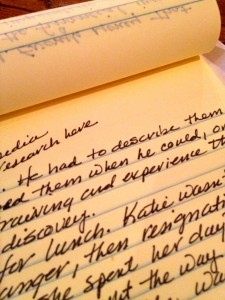
Why Titles Matter
5 Things to Do In Your First 3 Paragraphs
Three Strategies For Snaring The Senses
Foreshadowing and Establishing Conflict
Active Verbs
Revising Through a Single Lens


Why Titles Matter
5 Things to Do In Your First 3 Paragraphs
Three Strategies For Snaring The Senses
Foreshadowing and Establishing Conflict
Active Verbs
Revising Through a Single Lens
Want access to a lively community of writers and readers, free writing classes, co-working sessions, special speakers, weekly writing games, random pictures and MORE for as little as $2? Check out Cat’s Patreon campaign.

"(On the writing F&SF workshop) Wanted to crow and say thanks: the first story I wrote after taking your class was my very first sale. Coincidence? nah….thanks so much."
 What I’ve realized I need is a system with a single notebook. One problem with decluttering has been the number of old, half-filled notebooks that have surfaced amid the piles and books, some taken from the storage locker after lingering there a literal decade. I’m writing this originally in one of those: 5×8, unruled, a stiff, translucent purple cover, originally intended as a spiritual journal. Since then it’s accumulated a number of to-do lists, some pieces of stories, a few book review notes, and some timed writings (including “Prophetic Lobster Man,” which appeared in The Mad Scientist Journal).
What I’ve realized I need is a system with a single notebook. One problem with decluttering has been the number of old, half-filled notebooks that have surfaced amid the piles and books, some taken from the storage locker after lingering there a literal decade. I’m writing this originally in one of those: 5×8, unruled, a stiff, translucent purple cover, originally intended as a spiritual journal. Since then it’s accumulated a number of to-do lists, some pieces of stories, a few book review notes, and some timed writings (including “Prophetic Lobster Man,” which appeared in The Mad Scientist Journal).
But it must go in a box and soon. I can’t trail fifteen gazillion notebooks along on a trip. I need one at a time, and preferably one that fits easily in a purse so I can have it ever handy but still has enough page space that I don’t feel cramped. Writing on scraps of paper when no notebook is handy has been my undoing in the past.
At the same time, I need to back up what I’m doing, so I’m contemplating a system where I write in my (solitary) notebook and then transcribe either every night or as time permits.
I hope to go through (many more) than one notebook, so I’ll mail the filled ones as they accumulate, probably to my friend Caren.
I have been thinking about why the idea of losing writing bothers me so much. Part of it is my consciousness of having lost big chunks of it in the past: an entire novel, multiple half-finished short stories, poems, and journals entries (the last of arguable interest or value to anyone but me).
Because I could see myself going back to some, at least, of that stuff to remind myself of what that age was like when writing a character somewhere around the same age. Or to mine for stuff. Or simply to see how I’ve changed.
I feel as though most of my writing should be out there working for me. Ironically enough for someone with socialist leanings, I think of the pieces as rental properties, which should be actually housing readers, however temporarily, and earning me either money or fans who will buy other pieces.
In this attitude, I am a crassly commercial writer, despite my literary background, and I feel that when writing that could be out there earning for me isn’t, it’s wasted. It’s not that I feel every word of mine is so valuable that I must get paid for it — there’s plenty of journal maunderings and half-finished stories or essays and always will be.
It’s more that, as a writer, and particularly as someone who’s been primarily a short story writer, I am painfully aware of how crappily we’re paid.
So I want to make the most of the words that spill out of me and, more than that, I know that I’m vain enough that praise is a worthy form of coin. I love it when someone’s read a piece and praises it in an e-mail or a public recommendation.
So how can I best preserve these efforts, in order to most effectively sing for my supper? Notebook and Google Docs seem my best bet so far.
And crucial to this effort as well: putting away all these current half-filled notebooks. One more part of the de-cluttering, a process where I’m currently down to the last 10% or so, a few loads for Value Village and a suitcase or two now that the storage pods have come and swallowed up the heap of boxes that had towered in the front room here. Doing a load of laundry, I’m mentally consigning half the shirts to the discard heap, weighting clothing on a new algorithm of comfort plus presentability plus durability/discardability.
Almost ready to launch.
...
 Recently the question of omniscient POV has come up in several classes, so I started reading some examples of it. One of the best I hit was Sherwood Smith’s Inda series. I figured, why not go to Sherwood and ask some questions about how she pulled that off.
Recently the question of omniscient POV has come up in several classes, so I started reading some examples of it. One of the best I hit was Sherwood Smith’s Inda series. I figured, why not go to Sherwood and ask some questions about how she pulled that off.
What drew you to using omniscient point of view for the Inda series? What sorts of stories work particularly well with that POV? Were there any models that you looked when working with it?
I had always written in omni. I’m a visual writer (with all its pluses and pitfalls), which means I see a movie in my head””not just dialogue but characters’ inner lives. Omni always seemed the easiest way to get that movie down.
But when I started selling, I was told to switch to limited third, which I had to learn.
Segue up a couple decades, I was desperate to escape the limitations of third, and omni was no longer (trigger doom music) Forbidden. I had to relearn omni, by which I mean consciously grasping the difference between omniscient voice and head-hopping. (Some readers will call omniscient voice head-hopping. My guess is that some of these readers might have had little exposure to early novels.)
To review omni, I went back to the eighteenth and nineteenth century books I’d grown up reading, with an eye to the development of narrative voice: I noted how Jane Austen invented the modern novel with her mostly-offstage narrator, which had been influenced by Henry Fielding‘s rudimentary narrative style in Tom Jones, and Samuel Richardson‘s experimentation in Clarissa. I reread William Thackeray‘s Vanity Fair, whose narrator strides right out on stage, breaking the fourth wall to directly address the audience.
I came to the conclusion that every novel, actually, has a narrator. Including those written in limited third or even camera-eye view. But many writers don’t recognize that. Maybe they don’t need to. Everybody’s process is different. For me, it’s a helpful rule or reminder for handling diegesis as well as mimesis, and how to incorporate elements like public, private, and intimate space (each with its discrete focus), how to slide into free indirect discourse, etc.
Anyway, with Inda””with any big, braided story””I find limited third so, um, limiting. It’s so difficult to get all the POVs in you want and not jerk the reader back and forth in time, or break the narrative into little scenes in order to properly isolate those POV changes. If you’ve got a narrator, and know why that narrator is telling the story, I think one can better see the entire structure of the novel, and determine how many POVs to use, where, and when.
What difficulties presented themselves as a result? What did you have to be mindful about as you were writing?
Slipping too frequently into diegesis, especially when tired, and summarizing what ought to be scenes. When I say tired, I don’t mean single sessions, though that is true, too. I mean those long months, even years, it takes to write a novel””sometimes forgetting it takes a few hours to read it. Another aspect to be mindful of is limiting the access to characters’ thoughts to those needed for not just the action through-line but the emotional through-line. And cut out all the other voices yammering, or they can proliferate fast into side-stories.
What issues did it present when rewriting?
Those side-stories. Also, figuring out when to let the narrator come forward.
Was there anything that surprised you about using it?
Not really, because I’d grown up writing omni. The surprise was the realization that all novels have narrators.
One of the biggest concerns about using omniscient POV is that readers have been trained to spot “head-hopping” as a flaw. Do you have any strategies for avoiding this?
Some readers are not going to like it no matter what. Maybe a matter of taste, or of training””if you’d grown up reading only first or third, omni can come as a surprise. I’ve heard readers say they won’t read first person, or second, or present tense, or omni. That’s a taste call. I think it makes it easier to get used to when the writer works to make certain that every shift or transition is grounded””that there are no floating pronouns so the reader is forced to go paging back for the antecedent. (And yeah, it’s so easy to screw up even when trying to focus on that specifically.)
What are you working on right now and what POV is it in?
A series, called the Young Allies, that will begin coming out from DAW next summer. It is all complete, and written in omni. Same narrator as Inda.
What’s the best entry point into your work if a reader’s looking for a book to start with? Inda or something else?
I guess that depends what type of story they are looking for? YAs I usually direct to Crown Duel, which is an early work, but it’s stayed in print since the nineties. (I recommend the ebook version though””it has fewer errors.) Then there is the four-book Inda series, for fantasy, and the ebook version of Exordium, a five book space opera I wrote with Dave Trowbridge.
—————————
For more about Sherwood Smith, visit her website at www.sherwoodsmith.net. Follow her on Twitter here.
...

This site is protected by reCAPTCHA and the Google Privacy Policy and Terms of Service apply. This site is a participant in the Amazon Services LLC Associates Program, an affiliate advertising program designed to provide a means for sites to earn advertising fees by advertising and linking to Amazon.com.
5 Responses
Five Things to Do in Your First Three Paragraphs was fantastic.
I would like to see a post on how to plot short stories, and how to keep control over the story in a way that suits the intended length, etc. Plot arc and narrative scope are things I sort of “feel my way through,” and I’d like to be more tidy about it.
That sounds like a great topic to me, maybe even two really. I’ll start thinking about those!
“5 things” was my favorite of the recent posts. I’ll use it every time I’m going over my finished draft to be sure I have all of those covered. Thank you!
I agree with the first comment. I’d really like to see something about plotting and narrative scope as well. I also appreciated the exercise you did with the first sentences, and wouldn’t mind more exercises if you had others. Really my favorite part of your posts is that you use such good examples and easily explain why they work and how novices can aim for that level of skill. I’m sure I’ll find any topic useful if you write about it in the same instructional way.
Thanks again for posting these!
I think it’s important to use examples to show what you mean, since language and meaning can be so wobbly sometimes. 🙂
You are quite welcome! Am I going to get a chance to chat with you at Norwescon?